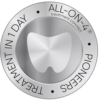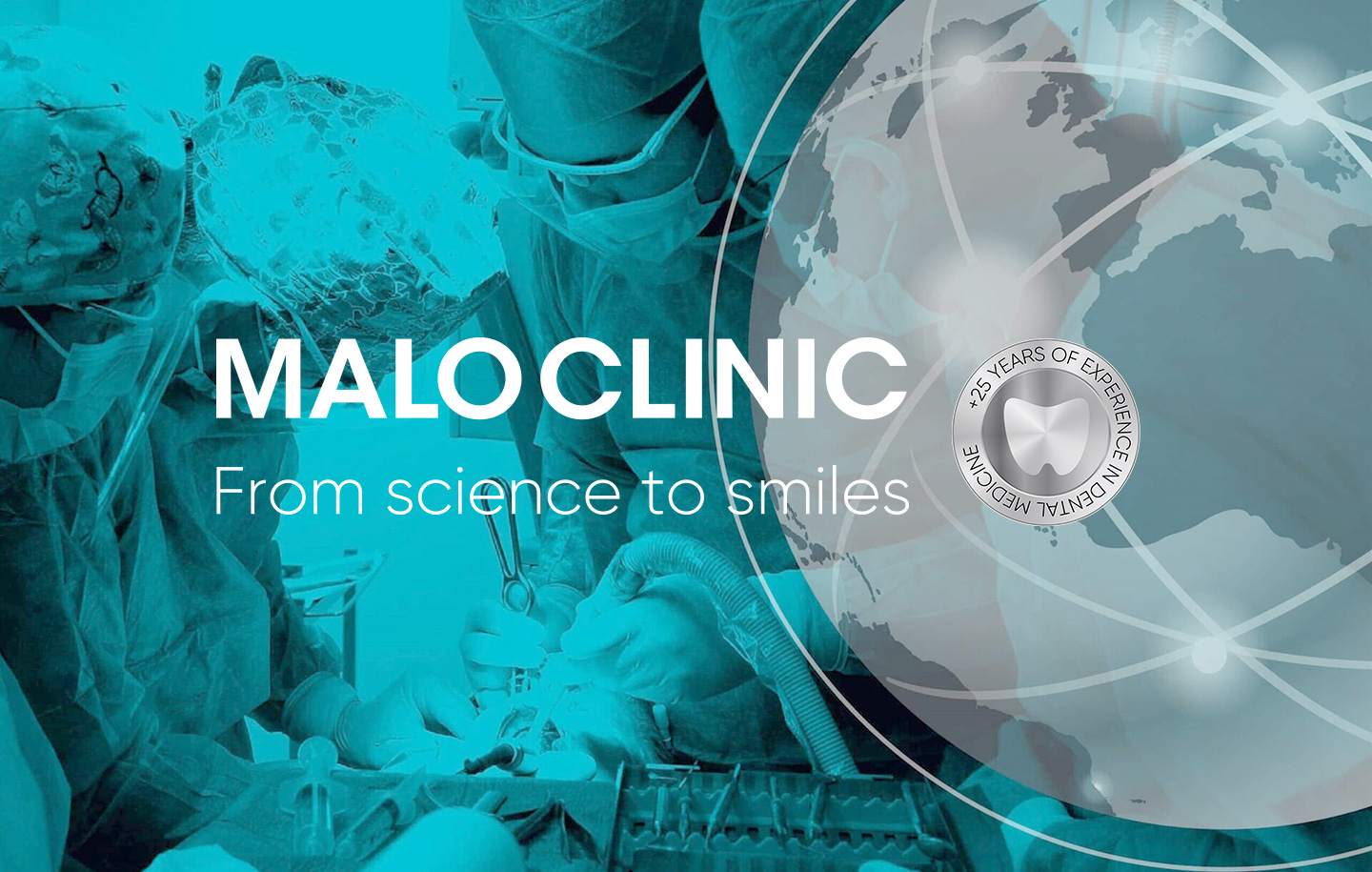
Poznaj twórców
All-on-4®
przełomowa
koncepcja leczenia
Zespół medyczny MALO CLINIC opracował tę metodę leczenia 25 lat temu w klinice w Lizbonie


Światowy lider w dziedzinie stomatologii i implantologii.
Malo Clinic istnieje od 1995 roku. Nowe techniki chirurgiczne, które zostały opracowane przez zespół badawczy ponad 25 lat temu w Malo Clinic w Lizbonie zadecydowały, iż Malo Clinic rozpoznawane jest jako światowy lider w implantologii i rehabilitacji stomatologicznej. Kluczem do sukcesu było opracowanie techniki All-on-4®, która umożliwia natychmiastową rehabilitację osób bezzębnych. Metoda ta została uznana za przełom w implantologii, jest przykładem rewolucyjnego wkładu Malo Clinic w tę dziedzinę medycyny. To dzięki Malo Clinic miliony Pacjentów na całym świcie mogą cieszyć się z nowego uśmiechu już w jeden dzień.
Malo Clinic to sieć klinik, które udokumentowały klinicznie swoją skuteczność w setkach badań klinicznych. Dzięki własnym opatentowanym technikom i protokołom chirurgicznym oraz centrum szkoleniowym Malo Clinic Education tysiące lekarzy z całego świata mogą podnosić jakość leczenia swoich pacjentów.
W Polsce Malo Clinic świadczy usługi nieprzerwanie od 2009 roku. Siedziba Malo Clinic Polska znajduje się w Warszawie, gdzie dostępni są dentyści wszystkich specjalizacji stomatologicznych, którzy zapewniają kompleksową i profesjonalną opiekę. W Szczecinie i w Gdyni działają punkty konsultacyjne Malo Clinic skupiające się na leczeniu bezzębia.
Malo Clinic
Światowy lider w dziedzinie stomatologii i implantologii.
Malo Clinic istnieje od 1995 roku. Nowe techniki chirurgiczne, które zostały opracowane przez zespół badawczy ponad 25 lat temu w Malo Clinic w Lizbonie zadecydowały, iż Malo Clinic rozpoznawane jest jako światowy lider w implantologii i rehabilitacji stomatologicznej. Kluczem do sukcesu było opracowanie techniki All-on-4®, która umożliwia natychmiastową rehabilitację osób bezzębnych.
W Polsce Malo Clinic świadczy usługi nieprzerwanie od 2009 roku. Siedziba Malo Clinic Polska znajduje się w Warszawie, gdzie dostępni są dentyści wszystkich specjalizacji stomatologicznych, którzy zapewniają kompleksową i profesjonalną opiekę. W Szczecinie i w Gdyni działają punkty konsultacyjne Malo Clinic skupiające się na leczeniu bezzębia.
Koncepcja leczenia All-on-4® według Malo Clinic Protocol to przełomowe rozwiązanie w leczeniu bezzębia w zaledwie 1 dzień. Bez bólu i bez przeszczepu kości.
All-on-4®
Malo Clinic Protocol
Metoda All-on-4® jest częścią MALO CLINIC PROTOCOL. W Malo Clinic odbudowujemy pełen łuk zębowy górny i/lub dolny stałym mostem opartym na czterech implantach, mocowanym w dniu zabiegu. Część chirurgiczna nie wymaga przeszczepu kości. W przypadku pacjentów, u których nastąpił znaczny zanik kości szczęk, specjalnie zaprojektowane implanty zakotwiczane są w kości jarzmowej.
Uśmiech w jeden dzień
W przypadku pacjentów z pełnym bezzębiem lub zębami nie rokującymi na skuteczne leczenie, zabieg gwarantuje natychmiastowe przywrócenie pełnej funkcjonalności jamy ustnej. Pacjent już w dniu zabiegu opuszcza klinikę z zębami. Dzięki użyciu najwyższej jakości materiałów most Malo Clinic Bridge umożliwia nie tylko odbudowę zębów, ale również rehabilitację tkanek miękkich – perfekcyjnie symuluje naturalne zęby, znacznie polepsza funkcje fonetyczne i żucia oraz jest łatwy w oczyszczaniu.
Nasza oferta
Metamorfozy uśmiechu
Zmieniamy życie
To autorski projekt Malo Clinic, w którym zmieniamy życie naszych pacjentów za darmo.
Braki w uzębieniu to nie tylko problem estetyczny, ale też zdrowotny. Od kilku lat na antenie DDTVN widzowie obserwują niezwykłe metamorfozy uśmiechu naszych pacjentów. Co roku wybieramy 8 osób, u których nieodpłatnie przeprowadzamy

natychmiastową odbudowę zębów według protokołów Malo Clinic. Nowy uśmiech to często zdecydowanie więcej niż tylko ładne zęby. To szansa na nowe życie, nowy start i nowe możliwości. Te historie inspirują i wzruszają. Jesteśmy dumni, że jesteśmy ich częścią.

Metamorfozy uśmiechu


Zmieniamy życie
To autorski projekt Malo Clinic, w którym zmieniamy życie naszych pacjentów za darmo.
Braki w uzębieniu to nie tylko problem estetyczny, ale też zdrowotny. Od kilku lat na antenie DDTVN widzowie obserwują niezwykłe metamorfozy uśmiechy naszych pacjentów. Co roku wybieramy 8 osób, u których nieodpłatnie przeprowadzamy
natychmiastową odbudowę zębów według protokołów Malo Clinic. Nowy uśmiech to często zdecydowanie więcej niż tylko ładne zęby. To szansa na nowe życie, nowy start i nowe możliwości. Te historie inspirują i wzruszają. Jesteśmy dumni, że jesteśmy ich częścią.
Podróż po uśmiech
Rozpocznij podróż po uśmiech
z Malo Clinic - gdziekolwiek teraz jesteś!
Mieszkasz i pracujesz za granica? Wiemy, jak ważne sa powroty do domu i jak cenny jest Twój czas. Chcesz zadbać o swój uśmiech i wciaż mieć czas dla bliskich? Z Malo Clinic to łatwiejsze niż myślisz. Specjalnie dla naszych pacjentów przygotowaliśmy spersonalizowana ofertę podróży po uśmiech. Wystarczy jedna wizyta, żeby znowu szeroko się uśmiechnać.

Aktualności
Chcesz być na bieżąco z naszymi promocjami i najlepszymi ofertami? Szukasz odpowiedzi na pytania związane ze stomatologią i leczeniem zębów? Zastanawiasz się, z których usług warto skorzystać? Wszystko to i jeszcze więcej znajdziesz właśnie tutaj.
PAKIET NA START
PAKIET NA START W MALO CLINIC Dlaczego to właśnie MALO CLINIC może być dla Was idealnym wyborem, jeśli Waszym celem jest kompleksowe zadbanie o zdrowie Waszych zębów i jamy ustnej? Przeczytajcie o tym, jak będzie wyglądać Pierwsza Wizyta w naszej…
nowe zęby w 1 dzień
Czasami do pełni szczęścia człowiek potrzebuje… uśmiechu. Tak właśnie było w przypadku pana Janusza, który został finalistą Metamorfozy Uśmiechu z Malo Clinic. Jeden dzień w naszej klinice sprawił, że odzyskał znacznie więcej niż dawno niewidziany uśmiech. Metamorfozy Uśmiechu W programie…
ORTODONCJA DZIECIĘCA w Malo Clinic w Warszawie
Kiedy pójść z dzieckiem do ortodonty? Dbanie o zęby kilkulatków potrafi być prawdziwym wyzwaniem. To czas, kiedy w życiu (i jamie ustnej!) dziecka naprawdę wiele się dzieje. Kiedy wypadną pierwsze zęby mleczne, a na ich miejscu pojawiają się zęby stałe,…
Casting Metamorfozy Uśmiechu
Casting zakończył się w dniu 4.02.2024 Dziękujemy za zaufanie. Otrzymaliśmy bardzo dużo zgłoszeń. Do końca lutego, maksymalnie do 7.03.24 zostanie wybrana 4 finalistów. 1 etap – redakcja DDTVN wybiera ok. 30-40 kandydatów, 2 etap – wybrane osoby zostaną zaproszone do…
PAKIET NA START
PAKIET NA START W MALO CLINIC Dlaczego to właśnie MALO CLINIC może być dla Was idealnym wyborem, jeśli Waszym celem…
nowe zęby w 1 dzień
Czasami do pełni szczęścia człowiek potrzebuje… uśmiechu. Tak właśnie było w przypadku pana Janusza, który został finalistą Metamorfozy Uśmiechu z…
ORTODONCJA DZIECIĘCA w Malo Clinic w Warszawie
Kiedy pójść z dzieckiem do ortodonty? Dbanie o zęby kilkulatków potrafi być prawdziwym wyzwaniem. To czas, kiedy w życiu (i…
Casting Metamorfozy Uśmiechu
Casting zakończył się w dniu 4.02.2024 Dziękujemy za zaufanie. Otrzymaliśmy bardzo dużo zgłoszeń. Do końca lutego, maksymalnie do 7.03.24 zostanie…
